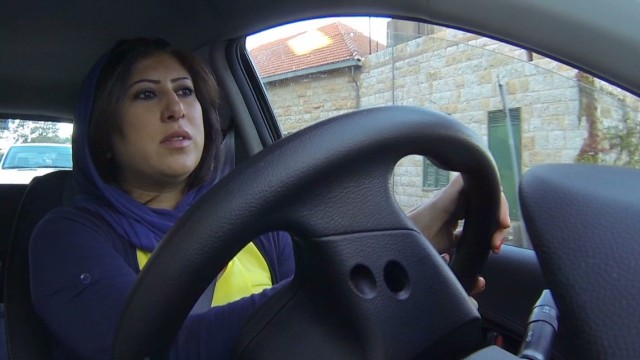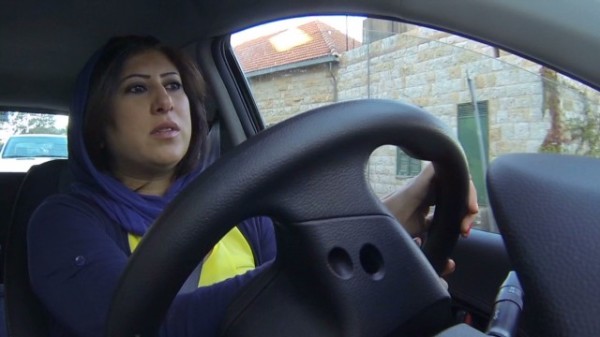
Women drive for change in Saudi Arabia
STORY HIGHLIGHTS
- Saudi women are preparing to defy a ban in the kingdom on women driving
- Mohammed Jamjoom, who grew up in Jeddah, recalls women dressing up as men to drive
- Saudi Arabia’s guardianship system means women can’t legally be responsible for own affairs
- October 26 Women’s Driving Campaign has garnered more than 16,000 petition signatures
There’s something extraordinary happening in Saudi Arabia right now. I should know — you see, I was born there, lived there half my life, speak the language and understand the customs. Lately, I’m both amazed at and humbled by what I’m seeing: Extremely brave Saudi women, more driven than ever to change their society, despite the sad fact that they still aren’t allowed to drive.
And while it’s true there’s no formal law that bans females from getting behind the wheel in the ultra-conservative kingdom, it is also by no means a stretch to say they are, indeed, prohibited from doing so. Unfortunately, that’s just the way it’s always been in a society where religious edicts are often interpreted to mean it is illegal for women to drive.
I’ve reported on this subject for years and must admit, it’s a personal one for me. Some of my earliest memories entail trying to figure out why my American mother would always drive me around Oklahoma City, where we spent our summers, but could never take me around Jeddah, where we lived the rest of the year.
To be honest, I only began pondering that mystery at the age of four on the days when my Saudi father was out of town on business, our driver was off, and I wanted ice cream. In the U.S., it was easy for my mom and I to hop in her car and go grab a banana split. What I wanted to know was why it was such a big deal in Saudi Arabia. Now, as a new online campaign urging Saudi women to defy their country’s driving ban kicks into high gear, I find myself reflecting on how much the issue has impacted my life.
Much of it goes back to one brutally hot afternoon when I was 6 years old, living in Jeddah, playing in the front yard — completely startled seeing my 15-year-old neighbor sneaking out of her house dressed like her Saudi father. She wasn’t just wearing his clothes, she’d drawn a moustache on her face and was hoisting his car keys too.
Her mission was simple but dangerous: Take her dad’s car for a spin around the neighborhood as he napped. In any other country, a simple act of rebellion. In Saudi Arabia, one that can, and has, gotten women arrested.
A few days ago, as we were filming our latest report on the women’s driving campaign, I asked prominent Saudi journalist Buthaina Al-Nasr if she’d ever done anything similar.
Laughing at the memory, she admitted how, once, at the age of 14, she’d borrowed her older brother’s car and taken it for a spin around the farm, far from the traffic of the city and any of its police.
Buthaina went on, describing how much she and her female friends longed to drive cars. She explained how they also wanted to ride bikes, or even just simply walk around “freely” – other activities for which Saudi women can face severe disapproval. There was really only one solution.
“We’d dress up like men,” explained Buthaina, “like boys, and we’d go around and it felt fun.”
Her anecdote made me smile even as it struck me as terribly sad. You see, “fun” is something that many of my female Saudi relatives told me over and over again they needed a lot more of.
It was the main reason my neighbor took her dad’s car for that joyride — which she’d been able to do without getting caught. To me, seeing how absolutely exhilarating the experience had been for her, she’d become a hero. A couple of days later, I asked her when she’d do it again. A funny look appeared on her face.
“I don’t know. I’m not sure what the point is,” she told me. “It’ll just make me want to keep driving more and more. I shouldn’t want that.”
It took me a long time to finally understand. She’d had a small but wonderful taste of fun and freedom, one she felt most Saudi women would never get. That made it hard to deal with, harder still for her to do it again. For her, it ended up being more bitter than sweet.
In Saudi Arabia, women aren’t simply kept from obtaining drivers’ licenses. No, they must contend with many more restrictions. The country’s mandatory guardianship system means women cannot legally be responsible for their own affairs. As such, a growing number of voices, both male and female, are calling for those laws to be repealed.
Author Abdullah Al-Alami, one of the most prominent Saudi men supporting the women’s new driving campaign, is among them.
“There is a group of ultraconservatives here who will try to do anything and everything to prevent women from exercising their rights,” Al-Alami told me. “Be it driving, going to school, working, traveling for that matter, receiving medical care. Many men that I know, we feel that it is crucial for us to support women who do this.”
During my formative years, I was lucky — I got to spend lots of time with very strong, independent, assertive women. My American mother, Saudi aunts and female cousins – they discussed women’s rights all the time. I listened to countless conversations where it was decided how it would be impossible for Saudi Arabia to forever bar women from driving.
They said the reasons were numerous: that it didn’t make sense economically; that it was too much of a burden on families to hire drivers; that Saudi society was advancing.
And then there was the horror story recounted by my aunt about the woman who lived down the street from her — the woman whose husband was at work, whose driver was running an errand, whose child had been injured. There was no way for her to get him to the hospital in time.
The laws will have to change, they’d say. In five to 10 years, they insisted, women would, no doubt, be allowed to drive. I first heard that refrain 33 years ago, in 1980, before my parents and I moved to Riyadh, Saudi Arabia’s capital.
I’ve been hearing it ever since. It wasn’t until 1991 that I thought the time might have finally come. That’s when 47 women protested the prohibition by driving through the streets of Riyadh. It was scandalous — dozens of the women were detained, banned from travel and suspended from their workplaces.
A second ray of hope appeared in May 2011, when prominent women’s rights activist Manal Al-Sharif uploaded to YouTube a video of herself driving in Saudi Arabia. As a result, she spent nine days in jail. But on June 17, dozens of women across Saudi Arabia, emboldened and inspired by her ordeal, went ahead, risked punishment and participated in the “Women2Drive” campaign — they didn’t just drive around, they also filmed and uploaded videos of themselves doing so. Still the laws did not change.
And now, the latest iteration is at hand. The October 26 Women’s Driving Campaign has so far garnered more than 16,000 signatures on its online petition, but as it turns out, women aren’t waiting until October 26. Many have already gone out, taken videos, posted them online. It’s incredible to see.
Buthaina Al-Nasr is an active supporter of the campaign. She lives in Lebanon now but talked to me at length about why the Saudi government needs to finally lift the ban — after all, it is the last country in the world that does not allow women to drive.
After driving her eight-year-old son Hisham to school, she told me a bit more about how much she’d love to be able to do the same in Saudi Arabia. She then shared a recurring daydream she has about being able to drive a car in her home country while wearing a dress — not while dressed up like her father or brother.
“It’s a silly daydream,” she told me, “but that’s a fact. It’s the reality of my society.”
Then she added, “I mean the daydream of a young girl should be how to get to the moon … Not driving a car.”



Leave a reply